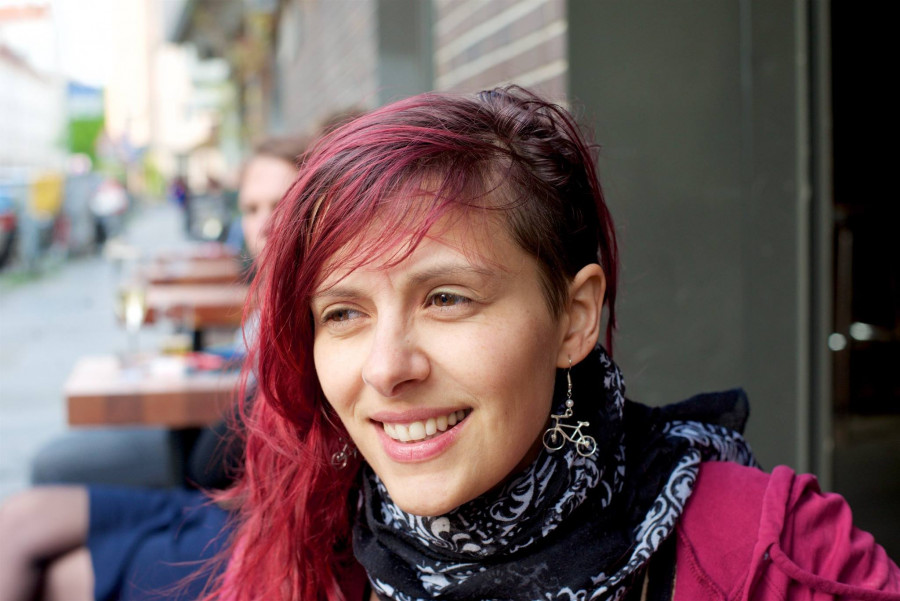Source: Private
From November 1st to December 15th PhD Tamara Mitrofanenko took part in the Leuphana working group of contextual dependencies within the tdAcademy project. She works at the BOKU (University University of Natural Resources and Life Sciences, Vienna) at the Institute for Landscape Development, Recreation and Conservation Planning (ILEN). As a guest researcher with the tdAcademy she developed ideas to support early career researchers in transdisciplinary research as well as a summer school concept. Additionally, Tamara was involved in a joint publication on contextual dependencies in transdisciplinary research.
Five months later, we talked to Tamara about her time with the tdAcademy and asked her about her past and current points of contact with transdisciplinary research and contextual dependencies.
What inspired you to become a guest researcher with the tdAcademy?
I was excited to receive the invitation from tdAcademy to become a guest researcher. Particularly, I was looking forward to exchange with colleagues, experts in different aspects of TD research; I was interested to learn more about integrating TD research into the work of Master and Bachelor students and I was excited to spend time in the team devoted to both transdisciplinarity and Education for Sustainable Development. Last but not least, I wanted to use this opportunity to interest and involve Leuphana colleagues more into TD processes in the Caucasus and Carpathian regions, where I am working.
What were your tasks and projects at tdAcademy?
I had the opportunity to develop ideas to support early career researchers, especially in Carpathian and Caucasus regions (integrated partly into the Science for the Carpathians Research Agenda, to be available soon). I also contributed to the development of the Science for the Carpathians Winter School by integrating inputs on TD and science-policy-practice interface. And last but not least, I had the chance to collaborate and exchange with tdAcademy colleagues and guest researchers.
What do you remember most about working with the tdAcademy?
I enjoyed meeting and spending some time with tdAcademy colleagues and other guest researchers in person, and I was glad to join the initial research planning meetings with Master and Bachelor students. The webinar we organized in the framework of tdAcademy inspired our further TD collaboration in the Causasus and Carpathian regions.
Which new insights into transdisciplinary research have you been able to gather?
As a result of developments during and after my stay at Leuphana and inspired by our discussion with Caucasus and Carpathian colleagues during the webinar we organized in the framework of the tdAcademy, we co-authored a chapter “Implementing Transdisciplinarity in the Caucasus region: societal conditions, institutional transitions, and perspectives” in the Handbook of Transdisciplinarity: Global Perspectives (Mitrofanenko et al., forthcoming), with colleagues from the Caucasus region, and Ulli Vilsmaier, another tdAcademy guest researcher.
The insights we gathered as a result of this work focused on the needs of the Caucasus region with respect to strengthening and supporting transdisciplinary approaches there.
Mitrofanenko, T.; Keryan, T; Shatberashvili, N.; Ghvinjilia, L.; Vilsmaier, U. (forthcoming) Implementing Transdisciplinarity in the Caucasus region: societal conditions, institutional transitions, and perspectives. In: Handbook of Transdisciplinarity: Global Perspectives, Lawrence, R.J. (ed). Edward Elgar Publishing Ltd.
Which importance do you ascribe to contextual dependencies in transdisciplinary research, and which core message do you think should be considered?
With respect to the regions where I am working, the Caucasus and the Carpathians, there is a need to engage more actors from the respective countries in practice, research and exchange with respect to transdisciplinary approaches, otherwise the consideration of contextual dependencies is not very representative.
Which projects are you currently working on and what are your plans for the future?
I am currently working on the project called “Carpathian ESD: Strengthening the ESD network in the Carpathian Convention via science-policy-practice interface”, in which Leuphana colleagues working on Education for Sustainable Development were involved, and I hope to continue supporting collaboration between Scientific Networks in the Carpathian and Caucasus region in the next years.
I am looking forward to continue dialogue on TD in the Mountain regions, and the needs of scientific networks in mountainous regions during the sessions at the International Mountain Conference, which I am co-organizing:
- ID35: Mapping transdisciplinary practices in mountain regions
- ID66: Supporting regional scientific mountain networks – role of EU policy
I have just submitted follow-up projects with the aims of 1) strengthening transdisciplinary approaches for applied university – community collaboration in Georgia: integrating co-created knowledge into policy and practice, and 2) understanding the role of universities in the context of (armed) conflict and applying TD approaches to address the needs of refugees and Internally Displaced Persons. Fingers crossed that they will be funded.
What is your vision for the work with context dependencies in transdisciplinary research?
I envision focusing further on the implementation and facilitation of transdisciplinary research in the context of rural mountainous regions, cross-border and cross-regional collaboration.
The tdAcademy team thanks Tamara Mitrofanenko for her participation and her valuable contributions to the tdAcademy and community.

